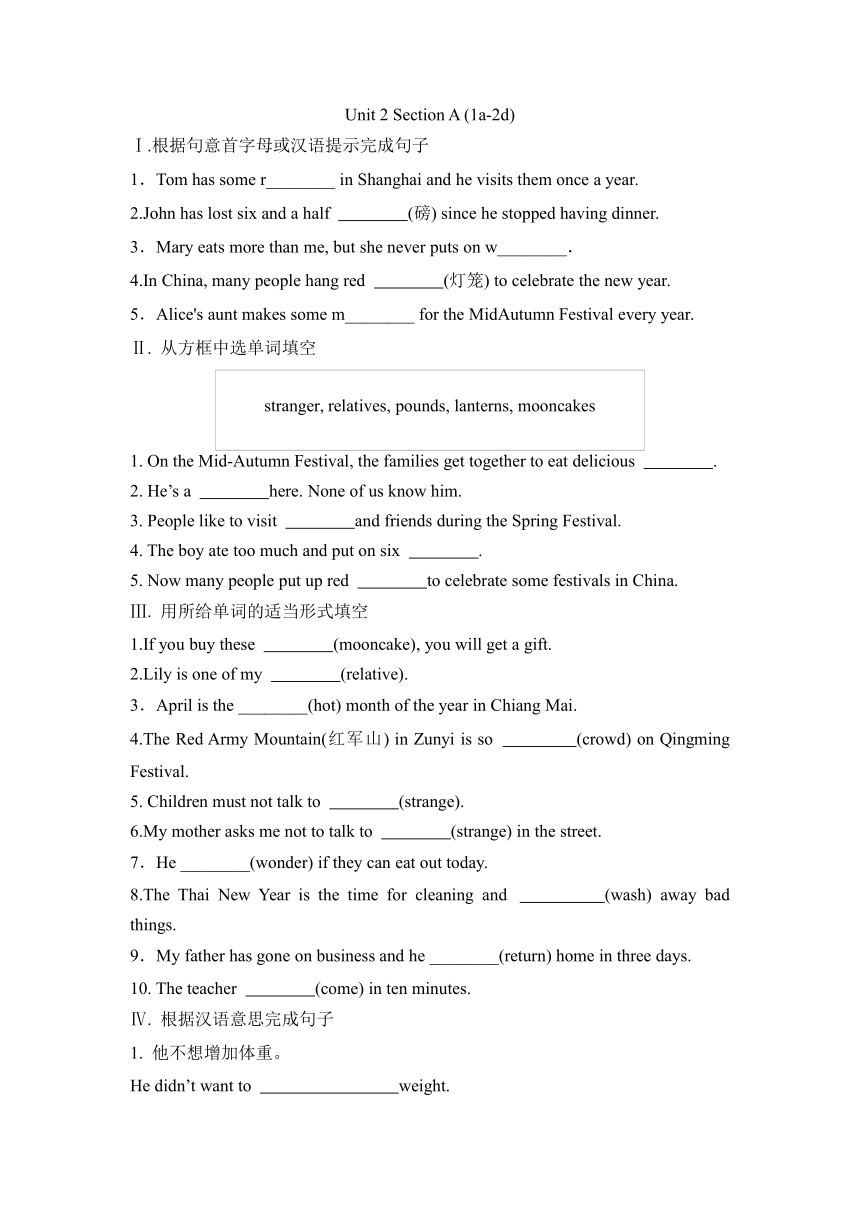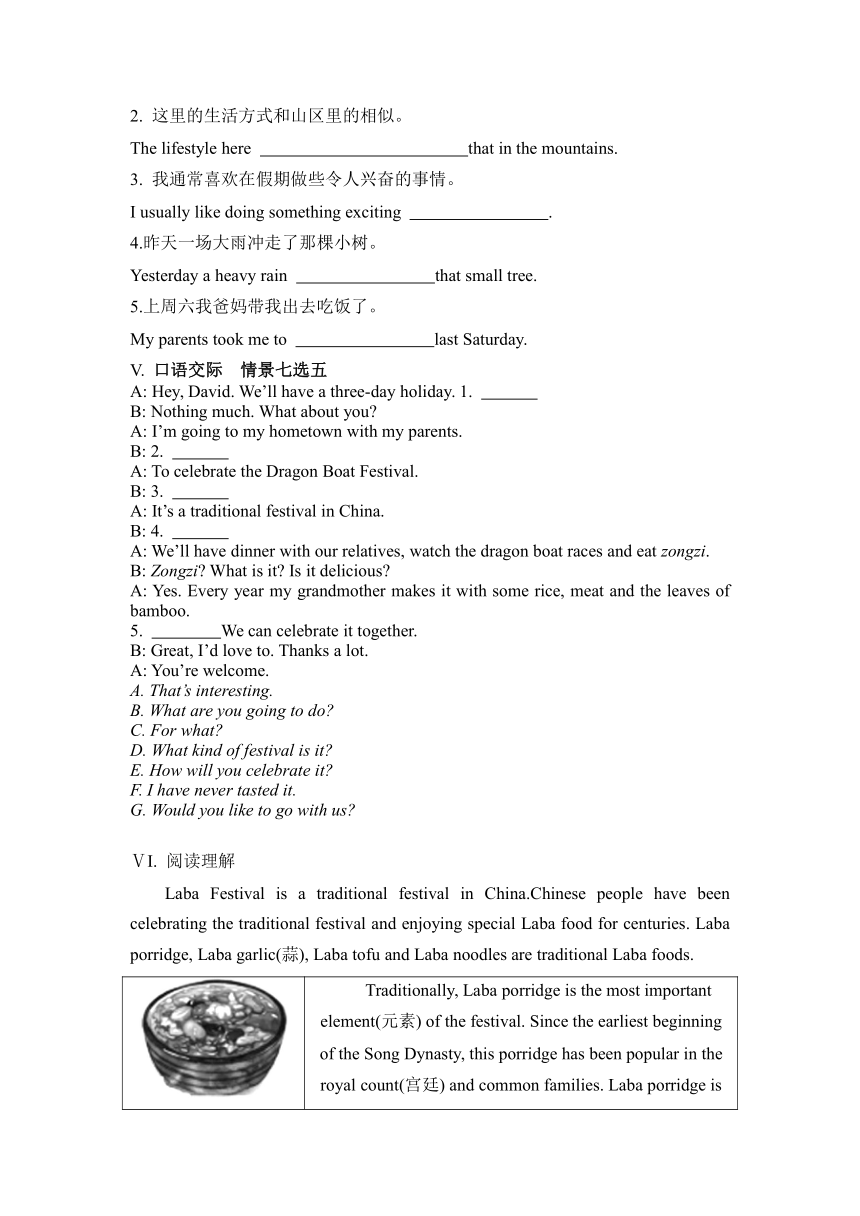Unit 2 I think that mooncakes are delicious! Section A (1a-2d) 同步练习 (无答案)
文档属性
| 名称 | Unit 2 I think that mooncakes are delicious! Section A (1a-2d) 同步练习 (无答案) |  | |
| 格式 | zip | ||
| 文件大小 | 295.5KB | ||
| 资源类型 | 教案 | ||
| 版本资源 | 人教新目标(Go for it)版 | ||
| 科目 | 英语 | ||
| 更新时间 | 2022-08-14 20:38:29 | ||
图片预览


文档简介
Unit 2 Section A (1a-2d)
Ⅰ.根据句意首字母或汉语提示完成句子
1.Tom has some r________ in Shanghai and he visits them once a year.
2.John has lost six and a half (磅) since he stopped having dinner.
3.Mary eats more than me, but she never puts on w________.
4.In China, many people hang red (灯笼) to celebrate the new year.
5.Alice's aunt makes some m________ for the MidAutumn Festival every year.
Ⅱ. 从方框中选单词填空
stranger, relatives, pounds, lanterns, mooncakes
1. On the Mid-Autumn Festival, the families get together to eat delicious .
2. He’s a here. None of us know him.
3. People like to visit and friends during the Spring Festival.
4. The boy ate too much and put on six .
5. Now many people put up red to celebrate some festivals in China.
Ⅲ. 用所给单词的适当形式填空
1.If you buy these (mooncake), you will get a gift.
2.Lily is one of my (relative).
3.April is the ________(hot) month of the year in Chiang Mai.
4.The Red Army Mountain(红军山) in Zunyi is so (crowd) on Qingming Festival.
5. Children must not talk to (strange).
6.My mother asks me not to talk to (strange) in the street.
7.He ________(wonder) if they can eat out today.
8.The Thai New Year is the time for cleaning and (wash) away bad things.
9.My father has gone on business and he ________(return) home in three days.
10. The teacher (come) in ten minutes.
Ⅳ. 根据汉语意思完成句子
1. 他不想增加体重。
He didn’t want to weight.
2. 这里的生活方式和山区里的相似。
The lifestyle here that in the mountains.
3. 我通常喜欢在假期做些令人兴奋的事情。
I usually like doing something exciting .
4.昨天一场大雨冲走了那棵小树。
Yesterday a heavy rain that small tree.
5.上周六我爸妈带我出去吃饭了。
My parents took me to last Saturday.
V. 口语交际 情景七选五
A: Hey, David. We’ll have a three-day holiday. 1.
B: Nothing much. What about you
A: I’m going to my hometown with my parents.
B: 2.
A: To celebrate the Dragon Boat Festival.
B: 3.
A: It’s a traditional festival in China.
B: 4.
A: We’ll have dinner with our relatives, watch the dragon boat races and eat zongzi.
B: Zongzi What is it Is it delicious
A: Yes. Every year my grandmother makes it with some rice, meat and the leaves of bamboo.
5. We can celebrate it together.
B: Great, I’d love to. Thanks a lot.
A: You’re welcome.
A. That’s interesting.
B. What are you going to do
C. For what
D. What kind of festival is it
E. How will you celebrate it
F. I have never tasted it.
G. Would you like to go with us
ⅤI. 阅读理解
Laba Festival is a traditional festival in China.Chinese people have been celebrating the traditional festival and enjoying special Laba food for centuries. Laba porridge, Laba garlic(蒜), Laba tofu and Laba noodles are traditional Laba foods.
Traditionally, Laba porridge is the most important element(元素) of the festival. Since the earliest beginning of the Song Dynasty, this porridge has been popular in the royal count(宫廷) and common families. Laba porridge is called “Union Food” in Henan Province, which is a food custom in memory of China's national hero Yue Fei.
Another custom is making Laba garlic. The process is very simple. Peel the garlic cloves(蒜瓣) and wash them. After drying, put them into a jar(罐子), and then pour vinegar into it. At last, seal the jar. Gradually, those garlic cloves will turn green. By the time of the Spring Festival, you can taste Laba garlic while eating dumplings.
In some places of the North that do not produce or produce less of the rice, people eat Laba noodles instead of the Laba porridge. On the day before the festival, people cut up all kinds of fruits and vegetables and prepare the noodle roll. Then on the morning of Laba Festival, the whole family can eat Laba noodles.
Laba tofu is the folk speciality(特产) of Yi County in Anhui Province. Before Laba Festival, every family in Yi County will dry tofu in the open space.
( )1.What does the first part of the form mainly tell us
A.The process of making Laba porridge.
B.The influence of Laba porridge.
C.The introduction of Laba porridge.
D.The symbol of Laba porridge.
( )2.What may the underlined word “vinegar” be
A.A kind of material to make Laba garlic.
B.A kind of food made out of Laba garlic.
C.A kind of mixture with Laba garlic.
D.A kind of water used to wash garlic cloves.
( )3.What can we know about Laba noodles
A.They're made on the afternoon of Laba Festival.
B.People eat them for Laba breakfast.
C.They're made of rice, fruit and vegetables.
D.They're popular across the country.
( )4.Which of the following is TRUE
A.People celebrate Laba Festival to remember Yue Fei.
B.People share Laba garlic on Laba Festival.
C.There is much rice in Laba noodles.
D.Yi County is the home of Laba tofu.
( )5.What does the passage mainly tell us
A.The food customs of Laba Festival.
B.Ways to celebrate Laba Festival.
C.The history of Laba Festival.
D.The importance of Laba Festival.
Ⅰ.根据句意首字母或汉语提示完成句子
1.Tom has some r________ in Shanghai and he visits them once a year.
2.John has lost six and a half (磅) since he stopped having dinner.
3.Mary eats more than me, but she never puts on w________.
4.In China, many people hang red (灯笼) to celebrate the new year.
5.Alice's aunt makes some m________ for the MidAutumn Festival every year.
Ⅱ. 从方框中选单词填空
stranger, relatives, pounds, lanterns, mooncakes
1. On the Mid-Autumn Festival, the families get together to eat delicious .
2. He’s a here. None of us know him.
3. People like to visit and friends during the Spring Festival.
4. The boy ate too much and put on six .
5. Now many people put up red to celebrate some festivals in China.
Ⅲ. 用所给单词的适当形式填空
1.If you buy these (mooncake), you will get a gift.
2.Lily is one of my (relative).
3.April is the ________(hot) month of the year in Chiang Mai.
4.The Red Army Mountain(红军山) in Zunyi is so (crowd) on Qingming Festival.
5. Children must not talk to (strange).
6.My mother asks me not to talk to (strange) in the street.
7.He ________(wonder) if they can eat out today.
8.The Thai New Year is the time for cleaning and (wash) away bad things.
9.My father has gone on business and he ________(return) home in three days.
10. The teacher (come) in ten minutes.
Ⅳ. 根据汉语意思完成句子
1. 他不想增加体重。
He didn’t want to weight.
2. 这里的生活方式和山区里的相似。
The lifestyle here that in the mountains.
3. 我通常喜欢在假期做些令人兴奋的事情。
I usually like doing something exciting .
4.昨天一场大雨冲走了那棵小树。
Yesterday a heavy rain that small tree.
5.上周六我爸妈带我出去吃饭了。
My parents took me to last Saturday.
V. 口语交际 情景七选五
A: Hey, David. We’ll have a three-day holiday. 1.
B: Nothing much. What about you
A: I’m going to my hometown with my parents.
B: 2.
A: To celebrate the Dragon Boat Festival.
B: 3.
A: It’s a traditional festival in China.
B: 4.
A: We’ll have dinner with our relatives, watch the dragon boat races and eat zongzi.
B: Zongzi What is it Is it delicious
A: Yes. Every year my grandmother makes it with some rice, meat and the leaves of bamboo.
5. We can celebrate it together.
B: Great, I’d love to. Thanks a lot.
A: You’re welcome.
A. That’s interesting.
B. What are you going to do
C. For what
D. What kind of festival is it
E. How will you celebrate it
F. I have never tasted it.
G. Would you like to go with us
ⅤI. 阅读理解
Laba Festival is a traditional festival in China.Chinese people have been celebrating the traditional festival and enjoying special Laba food for centuries. Laba porridge, Laba garlic(蒜), Laba tofu and Laba noodles are traditional Laba foods.
Traditionally, Laba porridge is the most important element(元素) of the festival. Since the earliest beginning of the Song Dynasty, this porridge has been popular in the royal count(宫廷) and common families. Laba porridge is called “Union Food” in Henan Province, which is a food custom in memory of China's national hero Yue Fei.
Another custom is making Laba garlic. The process is very simple. Peel the garlic cloves(蒜瓣) and wash them. After drying, put them into a jar(罐子), and then pour vinegar into it. At last, seal the jar. Gradually, those garlic cloves will turn green. By the time of the Spring Festival, you can taste Laba garlic while eating dumplings.
In some places of the North that do not produce or produce less of the rice, people eat Laba noodles instead of the Laba porridge. On the day before the festival, people cut up all kinds of fruits and vegetables and prepare the noodle roll. Then on the morning of Laba Festival, the whole family can eat Laba noodles.
Laba tofu is the folk speciality(特产) of Yi County in Anhui Province. Before Laba Festival, every family in Yi County will dry tofu in the open space.
( )1.What does the first part of the form mainly tell us
A.The process of making Laba porridge.
B.The influence of Laba porridge.
C.The introduction of Laba porridge.
D.The symbol of Laba porridge.
( )2.What may the underlined word “vinegar” be
A.A kind of material to make Laba garlic.
B.A kind of food made out of Laba garlic.
C.A kind of mixture with Laba garlic.
D.A kind of water used to wash garlic cloves.
( )3.What can we know about Laba noodles
A.They're made on the afternoon of Laba Festival.
B.People eat them for Laba breakfast.
C.They're made of rice, fruit and vegetables.
D.They're popular across the country.
( )4.Which of the following is TRUE
A.People celebrate Laba Festival to remember Yue Fei.
B.People share Laba garlic on Laba Festival.
C.There is much rice in Laba noodles.
D.Yi County is the home of Laba tofu.
( )5.What does the passage mainly tell us
A.The food customs of Laba Festival.
B.Ways to celebrate Laba Festival.
C.The history of Laba Festival.
D.The importance of Laba Festival.
同课章节目录
- Unit 1 How can we become good learners.
- Section A
- Section B
- Unit 2 I think that mooncakes are delicious!
- Section A
- Section B
- Unit 3 Could you please tell me where the restroom
- Section A
- Section B
- Unit 4 I used to be afraid of the dark.
- Section A
- Section B
- Unit 5 What are the shirts made of?
- Section A
- Section B
- Review of Units 1-5
- Unit 6 When was it invented?
- Section A
- Section B
- Unit 7 Teenagers should be allowed to choose their
- Section A
- Section B
- Unit 8 It must belong to Carla.
- Section A
- Section B
- Unit 9 I like music that I can dance to.
- Section A
- Section B
- Unit 10 You're supposed to shake hands.
- Section A
- Section B
- Review of Units 6-10
- Unit 11 Sad movies make me cry.
- Section A
- Section B
- Unit 12 Life is full of the unexpected
- Section A
- Section B
- Unit 13 We're trying to save the earth!
- Section A
- Section B
- Unit 14 I remember meeting all of you in Grade 7.
- Section A
- Section B
- Review of Units 11-14
